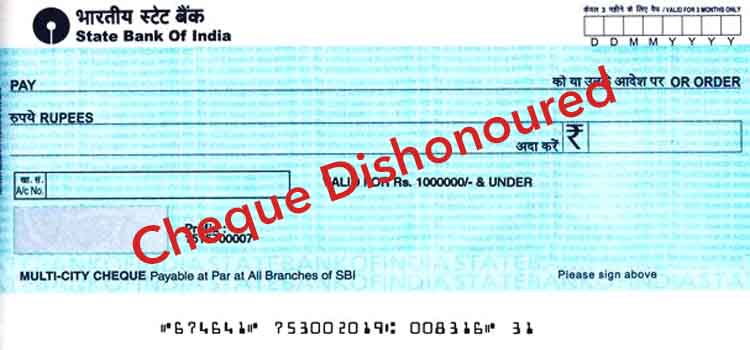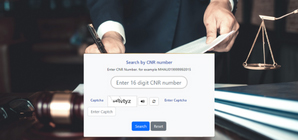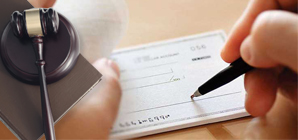Cheque Dishonoured - All FAQs Answered Here
Posted On : June 21, 2022

Table of Contents
Do you deal in cheques in day-to-day transactions? Have you ever got your cheque dishonoured? Find out 20 reasons why bank dishonour cheque and how you can evade legal trouble. One should know that not all reasons for dishonoured cheque bring in the right to sue another person under the Negotiable Instruments Act, 1881. Also, cheque dishonoured entry in cash book is a prerequisite for business organisations. Know more about how to evade cheque dishonoured charges hereunder.
What is Meaning of Cheque Dishonoured?
Dishonour in general can be understood when something which is no longer respected. A cheque is a negotiable instrument which is drawn in order to show credit liability against another person. A cheque inflicts a promise to pay a certain amount to the person whose name is mentioned in such a negotiable instrument (i.e. cheque). When after promising such payment, the transfer breaks due to any reason while in transaction, it is known as cheque dishonour. There are various reasons for dishonoured cheque including erroneous date, signature, etc. As per dishonour of cheque - Section 138 of Negotiable Instruments Act, 1881 punishes the issuer of cheque whose cheque has bounced due to insufficiency of funds. The NI Act 138 provision entitles the person to move the court under criminal provisions.
What Happens if a Cheque is Dishonoured?
After knowing the dishonoured cheque meaning, it is important to know the cheque bounce case process for those who frequently deal in cheques. Once a cheque returned dishonoured, it is recorded in bank records as well as in accounts of the business as evidence for further process. Parties have to pay cheque dishonoured charges. However, legal proceedings can be opted only if cheque dishonoured due to insufficiency of funds. The cheque bounce case procedure is as follows:
- Keep the dishonoured cheque and accompanying memo safe since it is going to be the base for cheque bounce case.
- Consult a cheque bounce advocate for legal advice on further process.
- Serve a legal notice to the person who drew the dishonoured cheque within 30 days of receiving the cheque dishonoured memo from the bank.
- Reprimand and give the person 15 days to make alterations regarding payment promised through cheque.
- On the 16th day, the person’s right to action begins against the drawer.
- Sue in the court of jurisdiction for dishonour of cheque - section 138.
- Along with the cheque dishonoured and bank memo, proving the debt is equally important as per law.
- The cheque bounce case process may take 2-3 years.
- Cheque bounce punishment in India as per Section 138 of NI Act, 1881 includes imprisonment upto 2 years and a fine which may be double the amount involved in cheque dishonoured.
What is the Difference between Cheque Bounce and Cheque Dishonoured?
‘Cheque bounce’ is a layman terminology whose technical or legal form is ‘cheque dishonoured’. When a cheque is produced before payee bank for encashment but gets returned because it did not qualify the technical requisites of the process, it is said to have been ‘bounced’ and followed by a stamp of ‘cheque dishonoured’. While many people won’t understand a dishonoured cheque that easily, use of ‘cheque bounce’ will in a jiffy explain the whole story to those who are not well aware of banking terminology. Hence, we can say that the difference between cheque bounce and cheque dishonoured is only terminological and not contextual. While dealing with dishonoured cheque, cheque bounce lawyers can help with the procedural technicality. Banks usually give a chance to loyal customers by contacting them through call and explaining the instance of cheque bounce so that it is timely corrected and customers evade unnecessary cheque dishonoured charges.
What are the Reasons for Dishonoured Cheque?
Find out 20 reasons why bank dishonour cheque and how you can avoid them.
- Missing Payee’s Details - A cheque specifically mentions the name of the person in whose favour such cheque is drawn. The account number of such a person is usually mentioned in the back of such a cheque. Thus, if any of such details are not mentioned, cheque dishonoured will be mentioned in the bank memo.
- Suspicion of a Forged Cheque - If the drawer has complained of stolen cheques of a certain series, or for some other justified reason the bank official feels like the cheque in hand could have been forged, it can be dishonoured.
- Insufficient Funds - When the amount drawn in cheque exceeds the balance available in the drawer’s bank account, it results in cheque dishonour.
- Missing or Erroneous Signature - If the cheque drawn lacks the drawer’s signature or does not match his usual signature at the time of clearance, it is also one of the reasons for dishonoured cheque in India.
- Missing Seal - In case the cheque has been drawn in the name of an organisation, along with the authorised person’s signature, it is important to have the organisation’s seal on that cheque. Know how banking lawyers near me help ease the technicalities of bank processes and relieve cheque dishonoured charges.
- Erroneous Date - When the date mentioned in the cheque has been overwritten or there is some error of numbers, the cheque may be bounced during clearance at the payee’s bank.
- Mismatch of Account - In case the account number entered by the officials is somehow different from that of the payee or drawer, there are chances of mismatch of account details and thus, dishonour of cheque.
- Contradicting Amount in Numbers and Words - When the amount in the cheque drawn is not the same as depicted in words as well as numbers in the block, it may result in cheque dishonoured.
- Scribbling or Overwriting - Cheques are an official instrument and various reasons for dishonoured cheque also include overwriting or not providing clear information due to scribbled cheque.
- Damage - Since it is a negotiable instrument for financial transactions, keeping this piece of paper intact is important. When a damaged cheque is deposited with the payee bank, it is plausible to be rejected in the first place. However, if at all it reaches the clearance phase, it may bring cheque dishonoured charges over the parties involved.
- Expired Cheque - Those who deal in cheques know that cheques come with a validity. If a cheque is not produced for encashment with the payee bank within that period, dishonour of cheque could be the result.
- Post Dated Cheque - Some people have the habit of drawing a post-dated cheque. However, ignorance of the person whom such a post-dated cheque is handed over for encashment may lead to cheque dishonoured charges for both.
- Overdraft Limit - Usually for businesses, banks offer overdraft facilities to debit a certain amount beyond the balance. If the amount cashed through cheque goes beyond the overdraft limit, dishonour of cheque is expected.
- Closed Account - If the drawer’s account is closed and cheque is produced for encashment thereafter, cheque dishonoured charges are inevitable.
- Payment Stopped - If due to whatever reason, the drawer of cheque restricts his/ her banking services from clearing a cheque, the cheque may bounce.
- Payment Limited - When an account holder sets a debit limit to a certain amount and the cheque drawn contains an amount beyond that limit, it could be one of the cheque dishonoured reasons.
- Death or Insanity or Insolvency - A dead person can not enter into financial transactions. The law of contract also restricts a person of unsound mind or an insolvent from entering into a contract. Hence, if a person who has been declared dead, insolvent or insane before the bank and such bank gets a request to clear a cheque drawn by that person, it could be the cause of why the cheque is dishonoured.
- Garnishee Order - When due to an ongoing case over financial debts, the court orders freezing the drawer’s bank account restricting any transactions, cheque bounce may result.
- Technical Error - Man has become a slave of technology. Sometimes, the machinery used for tracing the cheques for clearance are erroneous and thus, result in any of the above mentioned errors which thereby results in cheque dishonoured.
- 24 Hour policy - The new laws for cheque bounce requires cheque clearance within 24 hours regardless of whether there is a weekend in between. For those people who are not aware of this fact and are into the practice of drawing a cheque before confirming on their account balance should be wary of cheque bounce case.
Knowing the reasons for cheque bounce can save people from false cheque bounce case. One should be well aware that not every cheque dishonoured brings criminal liability under dishonour of cheque section 138. Being legally aware and knowing what happens if a cheque is dishonoured can save people from a lot of trouble.
























